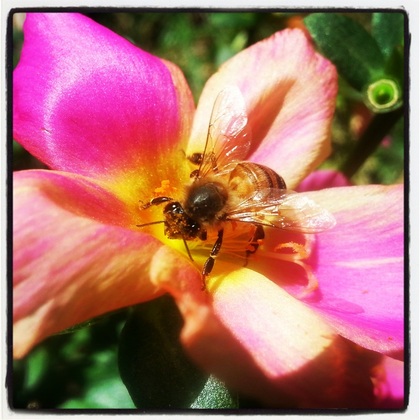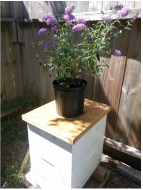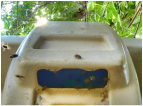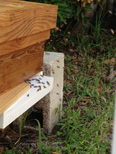SEA BEES APIARIES

Sea Bees Apiary on Sunset Lane is a waterfront refuge for honey bees, which have been dying in record numbers in the United States in recent years. Our apiary is a pesticide-free "coral reef" flower garden home for honey bees. The special wildflower honey the Sea Bees create is hand-extracted, and only the surplus honey is removed to ensure the bee colonies' health and happiness. Common misconception leads most people to view bees with fear and apprehension. Honey bees are actually quite docile, and only show signs of aggression when they feel their hive is in danger. Our colonies are not africanized, and we hope their presence in the local environment will contribute to strengthening the important role honey bees play in agriculture.
In addition to harvesting honey, we also offer bee removal services. We realize sometimes honey bees don't choose the most convenient places to call their home, and we are here to help. If honey bees have swarmed in an area where we can access their hive, we will be happy to remove them and give the colony a new home at Sea Bees Apiary.
In addition to harvesting honey, we also offer bee removal services. We realize sometimes honey bees don't choose the most convenient places to call their home, and we are here to help. If honey bees have swarmed in an area where we can access their hive, we will be happy to remove them and give the colony a new home at Sea Bees Apiary.
MEET THE SEA BEES HIVES

CAUCASIAN BEES Driven down from Williston, Florida, this is the hive that began Sea Bees Apiaries. The move to our floral-abundant location allowed this hive of Caucasian honey bees to grow rapidly, producing their first harvest of honey in just one month. Caucasian honey bees are slightly larger than feral Florida honey bees. This colony just recently was given a new queen, and is growing stronger and larger every day. These bees are very docile, and allow us to inspect their home without the use of protective gear! Caucasian bees typically have a longer tongue than other races of honey bees, allowing them to forage for honey from sources other bees cannot, producing a distinctly different tasting wildflower honey from our other colonies.

BOAT BEES Not long after the Caucasian beehive was brought to Sunset Lane, this wild swarm of Florida honey bees chose an old paddle boat sitting under a mango tree as their new home. This is Sea Bees Apiary's only completely wild hive, as the bees came to this location on their own with no direction from us. It is also the only hive that remains untouched, and serves as an interesting observation hive.

CEDAR BEES This is another hive of feral Florida honey bees. Although slightly more aggressive than their Caucasian neighbors, this is the largest hive at Sea Bees Apiaries. Their home is made from be